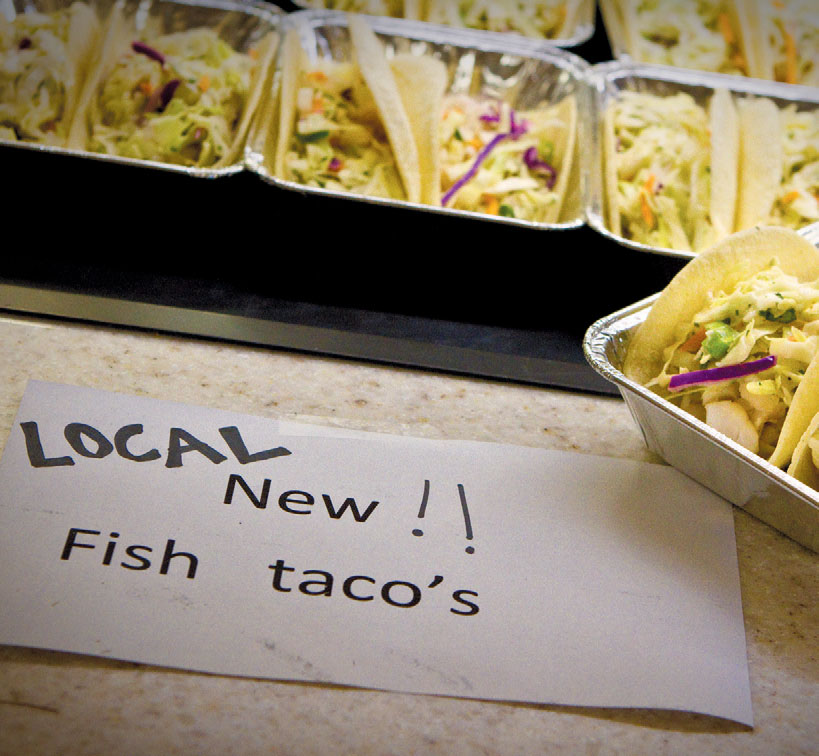Really good indeed
Real Good Fish’s Bay2Tray Brings Local Seafood to School Lunch Programs
Imported seafood often passes through a long, complex supply chain where human rights violations, environmental degradation and even mislabeling can be troubling for consumers who care. In contrast, community-supported fisheries (CSFs) offer transparency: Their members know exactly who caught the seafood, when and how. It’s often straight from the boat within 24 hours—fresh, local and delicious.
Modeled after community-supported agriculture programs (CSAs) for land-based foods, a growing number of CSFs around the country provide a consistent market for fishermen and, for their members, a trusted and reliable source of local seafood. One of these is Real Good Fish, founded in 2012 by Alan Lovewell and a fellow graduate student who was equally passionate about the ocean and equitable food systems. Based in Moss Landing, Real Good Fish now works with about 30 fishermen up and down the California Coast to offer regional and local seafood—caught sustainably—to more than 1,000 CSF members throughout the Bay Area. In our area, they offer weekly pickup sites in Sausalito, Mill Valley, San Anselmo, Fairfax and San Rafael.
Lovewell’s mission—to support community fishermen and provide greater access to high-quality sustainable seafood—would have been plenty for most. But not for Lovewell. In 2014, he launched Bay2Tray, a program that provides locally caught sustainable fish to schools.
“All people should be able to access the bounty of the ocean,” said Maria Finn, Real Good Fish’s director of marketing and a one-time commercial fisherwoman herself.
This is easier said than done, of course. Public schools are tasked with serving healthy meals that cost less than $1.25 per student, so Lovewell had to source substantially less expensive fish than what he offers to the business’s CSF members. Enter the Pacific grenadier, bycatch from black cod fisheries.
Bycatch is the term used for fish unintentionally caught in the pursuit of target fish. Black cod, a “Best Choice” or “Good Alternative” fish according to the Monterey Bay Aquarium’s Seafood Watch program (SeafoodWatch.org), is available year-round and commands a premium price. Fished with long-lines or pots, whole black cod commands $3.50 to $5 dollars a pound on the docks, according to Finn. Pacific grenadier, often hauled up along with black cod as it resides at the same ocean depths, commands little, if any, price, and is thrown back, often dead, in epic quantities. “Hundreds of tons are thrown back dead,” said Finn.
Sensing both a market opportunity and an additional opportunity to improve ocean ecology, Lovewell set up a pilot program at the Monterey Bay Unified School District and began to develop the market for grenadier.
There were hurdles. Cafeterias have gotten better about sourcing locally, but staff would need to be trained to work with the grenadier. As most school kitchens are short-staffed, the fish would need to be “kid-friendly” when it was delivered, i.e. without a single bone. Also inadvertently working against the grenadier market was Seafood Watch’s labeling of the fish as merely a “Good Alternative”—the Aquarium does not have room in its assessments for evaluating the utilization of bycatch, as opposed to throwing it away.
“There is not much science for Pacific grenadier because there is no market for the fish,” said Finn. And scientific studies can be very expensive.
Undeterred by these issues, Lovewell sallied forth, finding a market for grenadier and using the distribution system developed for the CSF to deliver the fish—processed, de-boned and frozen—to schools.
So far, it’s working. Bay2Tray has recently expanded to the Oakland Unified School District and its 33 schools, and is providing grenadier to school meal programs in La Honda/Pescadero, Santa Clara, Tustin and at UC Santa Cruz. Though the numbers remain small—the program has grown from 150 pounds during the pilot year to 4,950 pounds at last check—the amount of grenadier being utilized to feed people, rather than thrown dead back into the ocean, is growing.
Real Good Fish’s CSF subscribers will soon be able to support Bay- 2Tray through their purchases: Adding a $1.25 donation per week to the CSF purchase price will cover the cost of providing local fish for a school lunch.
Though it can be hard to see, eating local can have a huge impact on the health of our oceans and the myriad forms of life that thrive there.
“California can lead the nation with our value system and community support,” said Finn. And if that means children are eating more fish in the process, that is something we can all support.





